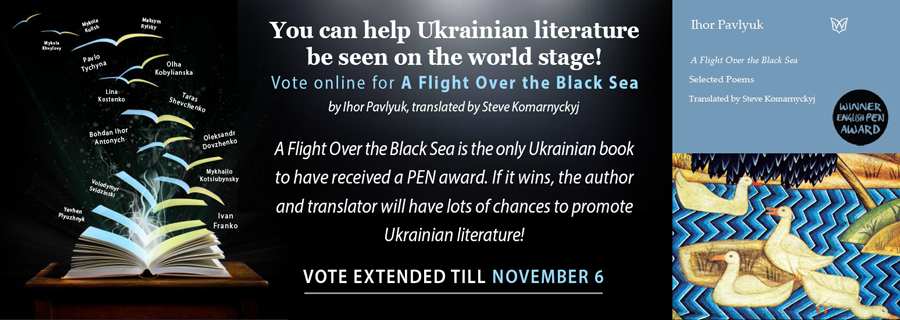Vote online for the only Ukrainian book ever awarded a PEN award at the PEN World Bookshelf contest.
I met Ihor Pavlyuk, whose poems I have translated for A Flight Over the Black Sea, in by the Shevchenko monument in Lviv in 2013. He produced two plastic tumblers and a hip flask of horilka and we chatted under the shadow of Pavlyuk’s great predecessor. Taras Shevchenko (1814-1861) Ukraine’s national poet, was perhaps the only major European writer ever to have been owned by another human being. Literature is the voice of a people and the standing of a nation’s literature reflects the extent to which it is free. Ukraine’s literature and language have been subject to legal restrictions for hundreds of years just as its people have been subjugated by foreign powers. Yet the literature is a unique part of Europe’s literary canon precisely because it was oppressed. Rory Finnin of Cambridge University describes it as literature of “risk takers.”The act of writing in Ukrainian was in itself an act of rebellion
The act of writing in Ukrainian was in itself an act of rebellion. Yet many westerners echo the view, propagated by some Russian imperialists, that the literature is inferior. As a 2012 Chatham House paper noted, some Russians view Ukrainian culture with hostility. From this perspective, the Ukrainian cultural heritage that binds the majority of Ukrainians together as a nation:
Taras Shevchenko’s legacy, Ukrainian language, and the Ukrainian ‘national idea’ of the last two centuries … appear to be meaningless, second-rate or blasphemous to a large number of Russians.
The volume of Russian and Ukrainian literature translated into English reflects the standing of both languages. Russian is one of the five most translated languages looming over the literary landscape like a lord striding through his pastures. Ukrainian by contrast does not even register in the statistics prepared by Literature Across Frontiers. The result is that the United Kingdom’s imagination of Ukraine is colonised by Russia. Ukrainians are often either invisible or represented negatively. They feature in images such as Bulgakov’s caricature of Skoropadsky as a swaggering popinjay in outlandish garments.
However, in 2014 my translations of Ihor Pavlyuk’s poems, A Flight Over the Black Sea, as published by Waterloo Press, won an English PEN award.
Ihor’s work conveys a unique aspect of Ukrainian culture – its harboring of pagan traditions within a literary language. Naomi Foyle, a British poet, described the book as a place where “despair is always infused with tenderness and personal desires drink from the well of collective dreams.” She noted that the translations had a “subtle music.” This piece perhaps best conveys the ecstatic paganism of his work and its rendering into English:
The Word Is Not An Apple
But the last leaf of the fall.
I converse with the autumnal forest using the language of gestures,
The smoke of my fatherland seeps down to my bones…
I sow my lyrical blood as seed,
A naked voice…
Like the crucified I do not love the mesh
Of trade, religious fanatics with their blank eyes,
The inane hiss of politics…
I yearn for the nocturnal rain,
And yet linger, tangled in waves of fragrance,
An angelic violin that cries with an imperceptible smile,
Remembering bright, kind, and somewhat inebriated Uncle Vasyl
Gathering nuts in Polissya.
I want to write a song that is like the world
Of all who came or who will come.
Then sleep in grass, as in a wolf skin,
While my genes dance, awaiting resurrection.
Ihor Pavlyuk, translated by Steve Komarnyckyj
The book could be voted the readers favorite on PEN England’s World Bookshelf. This accolade, which depends on your support, would help boost the profile of Ukrainian literature. So please support the book by clicking here and giving us your vote. We need as many votes as possible by 6 November 2015.
Let’s take a small step towards dismantling the Russian empire in England’s imagination.



